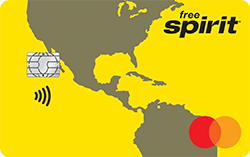Frontier and Spirit are two major players in the budget airline game. And while the service and experience of both can seem pretty similar, each have different routes, loyalty programs and fees, all of which can add up to a distinct value and experience.
So which airline should you fly? Here's what to consider when comparing Frontier Airlines and Spirit Airlines.
Which offers better flight options?
Which is more reliable?
Which has the best loyalty program?
Which offers better credit cards?
Which has lower fees?
Flight options
Winner for route availability: Spirit
Frontier and Spirit fly to cities all over the U.S. and beyond, including Mexico and the Caribbean. But Spirit flies to more destinations, particularly outside the U.S.
Frontier destinations
Frontier serves 83 destinations that cover most of the U.S. (from Maine to California and Texas to Montana), plus Mexico and the Caribbean. While Denver serves as the airline’s main hub, it operates secondary hubs in these locations:
Las Vegas.
Orlando Florida.
Philadelphia.
Spirit destinations
Spirit’s destination list is just a bit more robust than Frontier’s, flying to over 90 locations throughout the U.S., Mexico and the Caribbean, plus South and Central America.
Spirit’s main hub is in Fort Lauderdale, Florida, but it also uses the following cities as secondary hubs:
Chicago-O’Hare.
Detroit.
Dallas-Fort Worth.
Las Vegas.
Orlando.
Back to top
Reliability
Winner for reliability: Spirit
When looking at both airlines’ performance between July 2022 and July 2023, Spirit beats out Frontier as the most reliable option.
Frontier reliability
According to NerdWallet’s research, Frontier’s flights were on time 66.7% of the time, putting the airline at the bottom of the pile when it comes to timely touch-downs.
Frontier also canceled 2.21% of its flights and experienced tarmac delays at a rate of 2.36 per 10,000 flights. Meanwhile, mishandled baggage fell squarely in the middle of our analysis at 0.45% of all bags.
Spirit reliability
Spirit, on the other hand, beat out some larger carriers for on-time flights with 72.53% touching down on schedule, according to our analysis. Only slightly fewer flights were canceled (2.15%); tarmac delays occurred at a rate of 0.34 per 10,000 flights.
However, mishandled luggage seems to be a slightly larger issue with 0.52% of bags getting damaged or going missing.
Back to top
Airline loyalty programs
Rewards rate
Winner for loyalty program: Frontier
Another component to take into account when evaluating Frontier versus Spirit is their respective rewards programs and the benefits they offer. In this case, Frontier Miles are slightly more valuable.
Frontier loyalty program
The Frontier Miles frequent traveler program has its pros and cons. Earning miles is straightforward: one mile flown in physical distance equals one mile earned. Plus, you can earn additional miles by spending with a handful of travel and shopping partners.
Even though Frontier Miles are worth 1.1 cents a piece, according to NerdWallet valuations — you can still derive a lot of value from the program.
Note that award flights start at 10,000 miles per way, which is higher than some other airlines.
Spirit loyalty program
When Spirit updated its loyalty program in 2021, most of the changes were for the better. Its points, however, are worth around 0.8 centper point, slightly less than Frontier’s. How many points you earn per flight is based not on the distance flown but on the cost of your ticket, so more expensive fares mean more points. Free Spirit members will earn at least 6 points per dollar spent, plus additional points for some upgrades.
Reward redemptions start at 2,500 points, and members also have the option of using Free Spirit Points plus cash, which adds up to an award ticket faster or helps put smaller point totals to use. Members with a Spirit co-branded credit card or who have achieved Gold or Silver status can also pool points with up to eight friends and family members.
Elite status
Winner for elite status: Frontier
Though it may take longer to reach elite status, Frontier offers more high-value benefits to its elite members than Spirit.
Frontier elite status

NerdWallet rating
NerdWallet's ratings are determined by our editorial team. The scoring formula incorporates coverage options, customer experience, customizability, cost and more.
Read Review
The first level of elite status on Frontier, Elite 20K, is achieved by flying 20,000 miles or 25 segments, and it earns you access to perks like a free carry-on bag, family points pooling, waived redemption fees and free seat assignments. At higher statuses, you can enjoy a discounted or free Discount Den membership and free checked bags.
Unless you fly with Frontier multiple times a month, even the lowest status can be difficult to reach. Holding a Frontier Airlines World Mastercard® can accelerate your earnings rate by offering 5x miles on eligible Frontier purchases, 3x miles on restaurant spending and 1x miles on everything else. That’s in addition to the mileage earnings you already get from flying on Frontier flights.
Spirit elite status
You can reach elite status on Spirit Airlines by earning Status Qualifying Points (SPQs), which can be done by spending on Spirit flights or using a Spirit co-branded credit card. Silver status is achieved when you accumulate at least 2,000 SPQs.
However, the perks that come with reaching the first elite status level are meager. Silver status gets you things like priority boarding, seat selection at check-in, same-day standby and a redemption fee waiver — not much that has high value. Though holding status does mean you earn more points on every Spirit purchase you make.
It’s not until you reach Gold status — which requires 5,000 SQPs — that you get perks like free checked and carry-on bags, seat selection at purchase, complimentary onboard snacks and no change fees.
It may come as no surprise that NerdWallet values Spirit status below Frontier when it ranked the best airline rewards programs.
Back to top
Credit cards
Winner for best airline credit card: Spirit
Spirit Airlines offers more card options than Frontier, including a no-annual-fee option, plus holding the card means your reward miles don't expire.
Airline credit cards can improve your overall flight experience, and you can use them to collect miles strategically with either airline's loyalty program.
Frontier credit cards
Want extra perks and benefits for flying Frontier? Frontier offers one credit card to get them.
The Frontier Airlines World Mastercard®: Earn 50,000 bonus miles plus, $100 flight voucher, after spending $500 on purchases and paying the annual fee in full, both within the first 90 days. With this card, you can pool your miles with family, accelerate your earnings to achieve status and score a $100 flight voucher on your account anniversary, all for a reasonable annual fee: $89.
As a cardmember, your miles are less likely to expire — though you do need to use the card at least once every six months to keep them. Award redemption fees are also waived when holding this card.
Spirit Airlines credit cards

NerdWallet rating
NerdWallet's ratings are determined by our editorial team. The scoring formula incorporates coverage options, customer experience, customizability, cost and more.
Read Review
Spirit offers two credit cards for members of its loyalty program to earn extra rewards.
Free Spirit® Travel Mastercard®: Online offer: Earn 10,000 Bonus Points after making at least $500 in purchases within the first 90 days of account opening.You’ll also receive 5,000 bonus points on your cardmember anniversary after making at least $10,000 in purchases within the prior year. You’ll be able to pool your points with friends or family members, and your points won’t expire as long as your account is open. The annual fee for this card is $0.
Free Spirit® Travel More World Elite Mastercard®: Earn 50,000 Bonus Points + $100 Flight Voucher after making at least $1,000 in purchases in the first 90 days of account opening. The annual fee is $0 intro for the first year, then $79. You’ll receive a $100 companion flight voucher on every cardmember anniversary after making at least $5,000 in purchases during the prior year. You’ll also get access to points pooling, reach elite status sooner and pay no award flight redemption fees — plus your points won’t expire as long as you have the card.
Back to top
Fees
Winner for lowest fees: Spirit
While Spirit wins this round, it depends on the specific flight and if you prefer to choose a seat. But generally speaking, you can expect to pay a few dollars up to $30 more on Frontier for things like bag fees and seat selection.
Frontier fees
Frontier is a budget airline, after all, so expect extra fees beyond your ticket price for any comfort items or upgrades. You get to bring only a personal item for free — a carry-on will cost between $39 and $60 (depending on whether you pay for the bag during booking or at the gate). A checked bag costs between $38 and $60, and a second between $50 and $55.
There are additional fees for checked bags over 40 pounds. You'll pay $75 per bag, per direction for bags weighing 41-50 pounds and $100 per bag, per direction for bags weighing 51-100 pounds. Bags over 100 pounds aren't accepted.
You’ll also pay if you want to choose your seat. Standard seats range in price, with an average cost of about $28, according to NerdWallet calculations. And if you want the option to change your flight if something comes up, you’ll have to purchase Flight Flexibility coverage at the same time you book travel. Thankfully, this coverage starts at $1 per passenger, per direction.
Alternatively, you have the option to book a bundle called The Works, which includes a carry-on, checked bag, seat selection and priority boarding, as well as the ability to change your flight or be refunded. The cost depends on where you’re flying.
Spirit fees
Just like on Frontier, be prepared to pay for the extras if you want them on Spirit — anything more than a personal item will cost you.
Your baggage costs depend on where you’re going but expect to pay around $44 for a carry-on and $39 for your first checked bag.
Regular seats on Spirit start at $1 according to the airline, but we found the price ranges from $20-$52 on average. Spirit’s Big Front Seats start at $12 and can go up exponentially from there. If you want flexibility to change your flight after booking, you’ll have to opt for Flight Flex, which costs $5 to $69.
There is a Bundle It Combo that offers Spirit’s most popular upgrades like a checked bag, carry-on, seat selection and Flight Flex at a discount, but the price varies based on the route. You can only purchase it at the time of booking and it’s not available on all routes, so plan ahead.
Back to top
Is Spirit better than Frontier?
Spirit is attractive to more frequent international travelers, tends to be more reliable, and offers more credit card options, making it the winner in this budget airline face-off. That said, neither airline is a standout in terms of operational reliability, general elite status benefits, low fees or overall in-flight experience, but in a straight up comparison of Frontier Airlines and Spirit Airlines, Spirit ekes out a minor victory.
The battle between Frontier Airlines and Spirit is a close one, so it will likely come down to which airline is more convenient for you based on your desired destinations and departure point. But if you have the option, Spirit is the slightly better choice.
 Publish for free
Publish for free
























